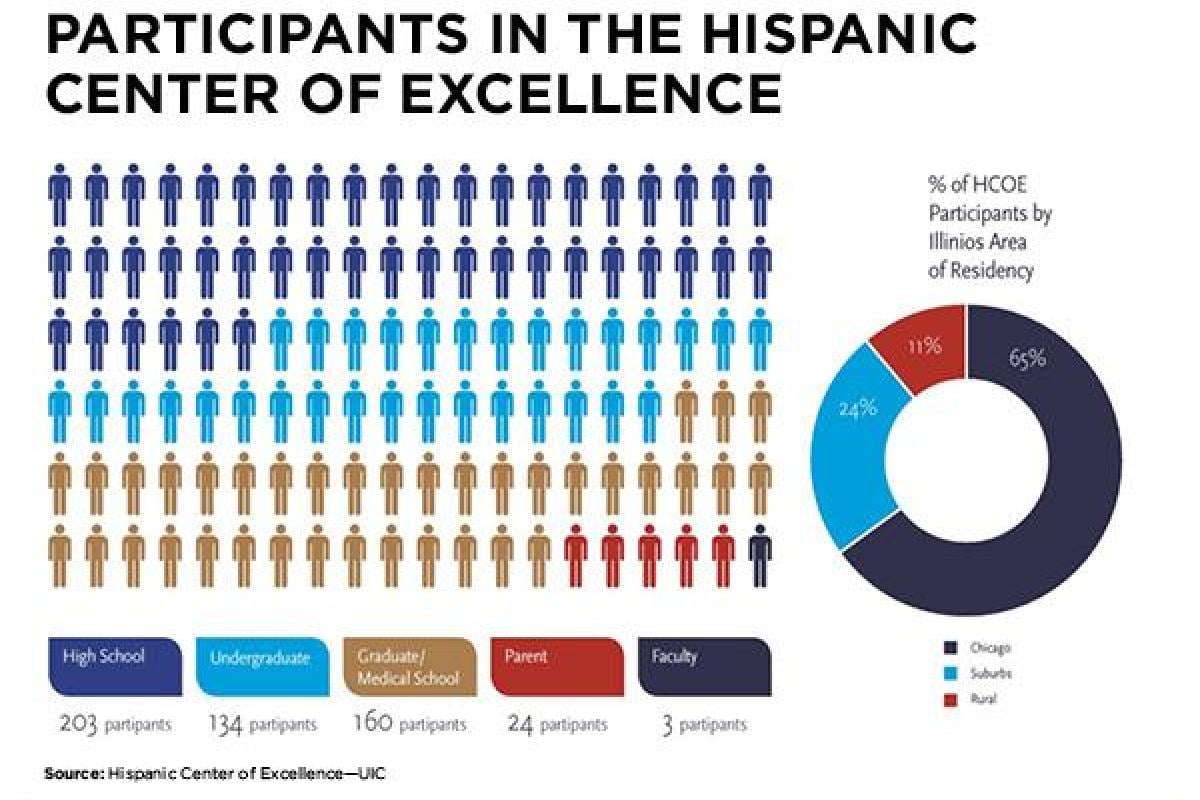Hispanic health is stuck in a paradox, according to the Centers for Disease Control and Prevention, underscoring the importance of addressing the complex needs of this patient population through diversifying the physician workforce. That’s precisely why several enriching programs at University of Illinois College of Medicine at Chicago (UIC) are preparing Hispanic students to enter medical school and excel as physicians. Here’s how they’re succeeding.

What’s keeping Hispanic students out of medicine
Bridging cultural gaps in medical education is no easy feat. Sometimes the job requires hours of program planning, guerrilla-style recruitment and candid conversations about generational challenges students may struggle to neatly package in a personal statement or college interview.
Jorge Girotti, PhD, is the director of the Hispanic Center for Excellence at UIC, which aims to “improve the medical care of Latinos in Illinois by providing programs that strengthen the pipeline and increase the number of Latino applicants pursuing health careers,” the center’s mission statement reads.
Dr. Girotti said he understands the unique challenges of diversifying medical school enrollment and is working on solutions to help Hispanic teens defeat societal hurdles most aspiring physicians rarely confront.
“Typically for medical students in the United States, the vast majority come from professional families,” Dr. Girotti said. “They have parents who are either medical professionals themselves or at the very least, college educated, so those students are on a path that’s well understood for them early in life.”
“Our students are the exact opposite. 80 percent of the students we work with come from families in which their parents don’t have a college education and in some instances, don’t even have a high school education. So even if they actually endorse and support the goals of their children, they don’t have the know-how or skills to give specific advice on how to maneuver” the rigorous process from medical school preparation to applications and matriculation, he explained.
To usher a new generation of Hispanic students into medicine, “our job is to short circuit a process that might take two or three generations to occur, but we have to make it happen now,” he said.
How UIC is helping Hispanic students excel in med school
This urgency for change has propelled leaders at UIC to invest in special programming at the Hispanic Center of Excellence. Dr. Girotti, who holds several leadership positions at UIC, has worked among a group of dedicated staff at the center to develop programs that prepare Hispanic students early in their academic careers to become linguistically and culturally competent physicians—and they’re already succeeding. Some of these creative programs and partnerships include:
The Medicina Academy Apprentice Program, is an engaging four-year pre-medical apprentice program that works in partnership with Chicago-area high schools to provide pathways for Latino students to prepare for professions in the medical field.
Students from each partnering and other high school are placed in a cohort of peers who will chart the four-year track together.
Students in the academy benefit from an enriching two-part curriculum that consists of field trips, seminars, lectures, workshops and lab sessions, and Red Cross certification courses that help prepare them for biomedical careers. The program meets on a monthly basis and already has sent two cohorts—totaling 60 students—to college.
The Latino Health Science Enrichment Program offers a six-week summer academic enrichment experience for high school students and incoming UIC freshman from Chicago and neighboring suburbs. The three-track program aims to offer Hispanic students holistic academic development, focusing on crucial aspects of college preparation, research skills development or guidance on how to transition to UIC. Each track also exposes students to medical and health science careers and activities to develop their interpersonal and business skills.
Medicina Scholars offers undergraduate Hispanic students academic guidance in entering the medical profession. The program’s three-year curriculum allows undergraduates to deepen their knowledge of important topics in the medical profession, such as the history of medicine, professional issues, public health policy, cultural competence, primary and specialized care, and medical school admissions.
In recent years, 40-50 percent of students in the program have been accepted to medical school and other health profession programs, Dr. Girotti said.
“Last year, we even had a [Scholar] who was actually at the University of Michigan, so we’ve developed some contacts and good resources in campuses outside of Illinois that help us coordinate with other students,” he added.
Through these focused solutions, Dr.Girotti said UIC has climbed ranks as the top medical school outside of Puerto Rico to graduate the highest number of Hispanic physicians—and they don’t intend to stop.
Also, check out these med ed and diversity resources
- Find out why the number of black men in medicine hasn’t increased since 1978 and follow these 5 med ed solutions to help boost diversity.
- Learn about the 21 medical students the AMA Foundation recently selected as future minority physician leaders. Read their unique perspectives on being a student of color in medical school and how they plan to succeed while promoting diversity in medicine.
- See how these medical schools are tackling challenges in health disparities and cultural competencies.
- Educate yourself and your peers on the 5 myths of diversity in med ed.
- Watch this Google hangout to learn more ways schools and students are promoting diversity in medical education.
- Visit the AMA Minority Affairs Section Web page, which features the latest on AMA policies, news and events to promote diversity in medicine and public health. You also can join the section to get more involved.




